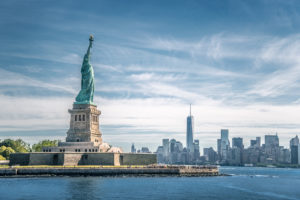
The Trump Administration releases a plan for COVID-19 vaccine distribution, a federal court declares Pennsylvania COVID-19 mandates unconstitutional, and more…
IN THE NEWS
- The Trump Administration released a plan for COVID-19 vaccine distribution. The plan includes measures to encourage vaccine uptake, expedite the approval and safe administration of a vaccine, and implement a system to track distribution. Robert Redfield, director of the Centers for Disease Control and Prevention, stated that he does not expect a vaccine to be available for wide distribution until at least the middle of 2021. President Donald J. Trump, however, later asserted that Redfield was mistaken, and a vaccine would be widely distributed before the end of 2020. Michael Ryan, executive director of the World Health Organization’s health emergencies program, emphasized the importance of consistent messaging from top officials.
- A federal district court held that certain provisions of Pennsylvania Governor Tom Wolf’s coronavirus mitigation orders are unconstitutional. The court found that limiting the number of people that can gather in one place violates the constitutional right of assembly and that the stay-at-home order and business closure requirement violated the Constitution’s Equal Protection and Due Process Clauses. The court emphasized that crisis responses “can never be permitted to supersede” individual liberties. In contrast, the U.S. Supreme Court wrote in May that it was “quite improbable” that a California order restricting the size of public gatherings was unconstitutional. The Wolf Administration will seek a temporary block on the decision while they file an appeal.
- A federal judge blocked the U.S. Department of Homeland Security from enforcing a series of rules narrowing the criteria for asylum applicants to receive work authorization. The rules sought to overhaul a system that authorizes asylum seekers to find employment as they await a decision on their asylum applications. In addition to blocking the agency from enforcing this package of rules, the judge also held that the appointment of Homeland Security Acting Secretary Chad Wolf was likely to be found invalid, echoing the findings of a U.S. Government Accountability Office report from August. New York Attorney General Letitia James celebrated the decision, referring to Wolf as one of the Trump Administration’s “lapdog appointees” who has “no authority and no business sitting in the chair of the acting secretary of Homeland Security.”
- The United Kingdom’s Medicines Health Regulatory Authority confirmed that pharmaceutical company AstraZeneca has resumed clinical trials of University of Oxford’s coronavirus vaccine following an investigation into a previous participant’s illness during the trial. AstraZeneca has remained tight lipped about the participant’s illness while emphasizing its commitment to industry and regulatory safety standards. U.S. Food and Drug Administration Commissioner Stephen Hahn reportedly said that clinical trials for the vaccine will not resume in the United States until the agency completes an investigation.
- President Donald J. Trump issued an executive order directing the U.S. Department of Health and Human Services to create regulations ensuring that Medicare will not pay pharmaceutical companies more for certain prescription drugs than the lowest prices paid in certain other countries. The order replaces an earlier executive order in light of the Trump Administration’s failure to negotiate a deal with drug manufacturers. Stephen Ubl, president and CEO of Pharmaceutical Research and Manufacturers of America—a drug lobbying group—critiqued the new order as “an irresponsible and unworkable policy” because it relies on how other countries set drug prices. Other experts do not foresee the order having an immediate impact.
- The U.S. Court of Appeals for the Eleventh Circuit upheld a Florida law that requires people with felony convictions to pay all court fines and fees before their voting rights may be restored. In 2018, Floridians voted to amend the state constitution to restore voting rights to certain people with felony convictions. The Florida legislature then passed a bill conditioning the right to vote on the completion of all criminal sentences, including the payment of fines and fees, which plaintiffs challenged in this lawsuit on the basis that the requirements violate the Twenty-Fourth Amendment. Julie Ebenstein, senior attorney with the American Civil Liberties Union, said that “this ruling runs counter to the foundational principle that Americans do not have to pay to vote.”
- In a 2-1 decision, the U.S. Court of Appeals for the Ninth Circuit upheld the Trump Administration’s action to end Temporary Protected Status for more than 400,000 people who immigrated from El Salvador, Haiti, Honduras, Nepal, Nicaragua, and Sudan without documentation. Temporary Protected Status had prevented these undocumented immigrants from being deported to countries that the Homeland Security secretary determined were “unable to handle the return of nationals adequately” due to conditions such as armed conflict and environmental disasters. The court found that the Homeland Security secretary has broad discretion, rejecting the argument that the decisions were improperly motivated by the President’s “animus against non-white and non-European immigrants.”
- The U.S. Customs and Border Patrol blocked shipments of imports from the Xinjiang region of China, which has received international scrutiny as the location of numerous internment camps for the region’s ethnic Muslim minority population. In a press release, the U.S. Department of Homeland Security said that the blocked shipments contained goods that had been produced through forced labor and that Customs and Border Patrol would continue to block similar products in the future. Acting Homeland Security Deputy Secretary Ken Cuccinelli called the forced labor practices occurring in Xinjiang “a type of modern slavery” and vowed to “protect American citizens from participating in these egregious human rights violations.”
- The U.S. Environmental Protection Agency (EPA) finalized a rule establishing procedures to issue guidance documents in an effort to increase transparency. The rule establishes a formal petition process for public requests to modify or withdraw EPA guidance documents and requires methods for public participation in the development of guidance documents. President Donald J. Trump signed an executive order in October 2019 that required EPA and other government agencies to promote transparency through better publicization of guidance documents. EPA Administrator Andrew Wheeler emphasized the significance of the rule and said that “for the first time ever, EPA is proposing a rule that codifies procedures to ensure the public can engage in the development and review of agency guidance,” adding that the rule ensures “that EPA is not creating new regulatory obligations through guidance.”
WHAT WE’RE READING THIS WEEK
- In an article in the William and Mary Law Review, David Zaring, a professor of legal studies and business ethics at the Wharton School, contributed to an ongoing debate around reforming bank charters, which are required licenses granted by the Office of the Comptroller of the Currency. Zaring explained that two main camps have emerged in the debate. On one side, academics contend that bank charters should be granted sparingly to protect the public. In contrast, regulators at the Office of the Comptroller of the Currency have begun to broaden the eligibility criteria to include financial technology companies in addition to traditional banks. Zaring concluded that the office should embrace a “special purpose fintech charter” to account for the growth of financial technology companies while creating greater transparency in its review process.
- A report by the International Drug Policy Consortium presented 20 social justice and human rights principles to guide jurisdictions in developing regulatory frameworks to legalize recreational marijuana. The principles include protecting the rights of people who use drugs, providing support for those who faced criminalization under prior marijuana laws, and investing in inclusive, equitable, and sustainable cultivation, trade, and usage of marijuana.
- In a recent paper, Alexander Sahn, a political science doctoral candidate at The University of California, Berkeley, analyzed the Great Migration, during which African Americans left the U.S. South in large numbers to flee racial violence. Sahn argued that local governments created many exclusionary zoning laws during the period of the Great Migration from 1940 to 1970 because of “conservative white racial attitudes” and white residents’ “preferences for racial segregation.” Through an analysis of historical zoning laws, Sahn found that the cities to which more Black people migrated to during this period now have more exclusionary zoning laws, fewer multi-family housing units available, and less affordable housing than cities that had lower Black migration rates .
FLASHBACK FRIDAY
- In an essay in The Regulatory Review, James Goodwin, senior policy analyst with the Center for Progressive Reform, argued that the regulatory process could benefit from public comment through folk art mediums. Goodwin believed that current public comment processes prevent many people without legal or technical skills from contributing to the regulatory process. Goodwin proposed that agencies encourage public submissions of folk art such as hip hop—an authentic, universally accessible, and culturally significant medium of communication—to re-democratize the rulemaking process.



